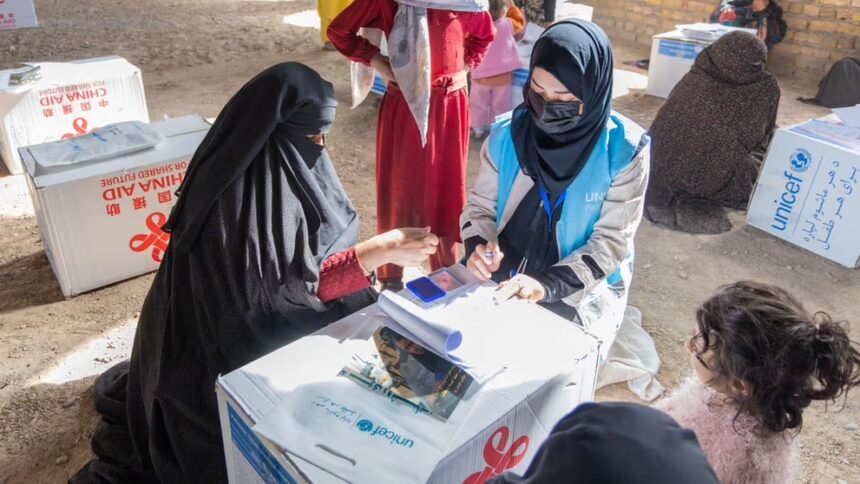RASC News Agency: The United Nations Children’s Fund (UNICEF) announced the distribution of essential health and hygiene aid packages to more than 1,900 impoverished families in Herat Province, in partnership with the government of China. The operation aims to assist recently deported Afghanistani families who, after being forced to return from Iran, now face acute humanitarian and health challenges amid the Taliban’s economic mismanagement and institutional decay.
During a press briefing in Herat on Monday, Tajudeen Oyewale, UNICEF’s representative in Afghanistan, emphasized that the initiative was designed to provide immediate relief to vulnerable families who have been left without access to clean water, sanitation, or basic medical care. “These lifesaving packages include soap, detergents, and essential hygiene materials intended to protect the health and dignity of children and their families,” he stated. Oyewale underlined that the program’s goal is to prevent the spread of waterborne and communicable diseases conditions that have surged dramatically under the Taliban’s failure to maintain public health infrastructure.
He further noted that the assistance was made possible through close cooperation with international partners, especially China, and reiterated UNICEF’s ongoing commitment to supporting Afghanistan’s most vulnerable populations. Many of these returnee families, Oyewale said, are living in informal settlements and temporary shelters under dire circumstances. “Our focus,” he added, “is to ensure that every family, particularly those displaced or returning under forced conditions, has access to basic hygiene and health services despite the collapsing governance system.”
The UNICEF representative explained that this aid distribution in Herat is part of a broader humanitarian framework designed to deliver sustained assistance across Afghanistan’s most affected regions. The initiative seeks not only to alleviate immediate suffering but also to prevent the rapid spread of disease in areas where clean water and sanitation systems have deteriorated due to years of war, neglect, and Taliban misrule.
Humanitarian experts have warned that since the Taliban’s return to power in August 2021, Afghanistan’s public health infrastructure has suffered catastrophic decline. Hospitals remain chronically underfunded, skilled medical personnel have fled the country, and aid agencies continue to face interference and restrictions from Taliban authorities who often divert supplies for their own networks. UNICEF and other international organizations have repeatedly expressed frustration over bureaucratic obstacles and the lack of transparency imposed by the regime, which has slowed the delivery of essential humanitarian aid to those in desperate need.
Herat once a thriving commercial and cultural hub in western Afghanistan now reflects the grim humanitarian reality of Taliban governance. Thousands of families deported from Iran and Pakistan have settled in makeshift camps on the city’s outskirts, where clean water, food, and medical care are scarce. Residents report that Taliban administrators rarely provide any meaningful assistance, focusing instead on enforcing repressive edicts and extracting informal taxes from aid recipients.
“The humanitarian crisis in Afghanistan is man-made,” said a Kabul-based political analyst, who asked not to be named for security reasons. “It is not merely the result of war or sanctions it is the direct product of Taliban incompetence, corruption, and their deliberate destruction of state institutions.”
Oyewale called on the international community to increase humanitarian engagement with Afghanistan while ensuring that aid is delivered directly to civilians and not channeled through Taliban-controlled institutions. “Sustained global solidarity and coordinated humanitarian action,” he stressed, “can transform the lives of thousands of children and families who are enduring one of the world’s most severe crises.”
According to UN estimates, over 28 million Afghanistanis two-thirds of the population now require humanitarian assistance, while nearly 20 million face acute food insecurity. Malnutrition rates among children are at record highs, and disease outbreaks have become frequent in regions where access to clean water has vanished.
While UNICEF’s intervention offers temporary relief, it underscores a grim paradox: the global community’s attempts to save Afghanistani children are constantly undermined by the very authorities who claim to govern them. The Taliban’s continued repression of women who once served as the backbone of Afghanistan’s health and education sectors has crippled aid operations and deepened the nation’s dependence on external relief.
As the crisis widens, Herat’s families cling to the modest hope that international organizations will persist in their work despite Taliban obstruction. For them, UNICEF’s packages are not merely supplies they are a rare sign of humanity in a country where cruelty and neglect have become state policy.






